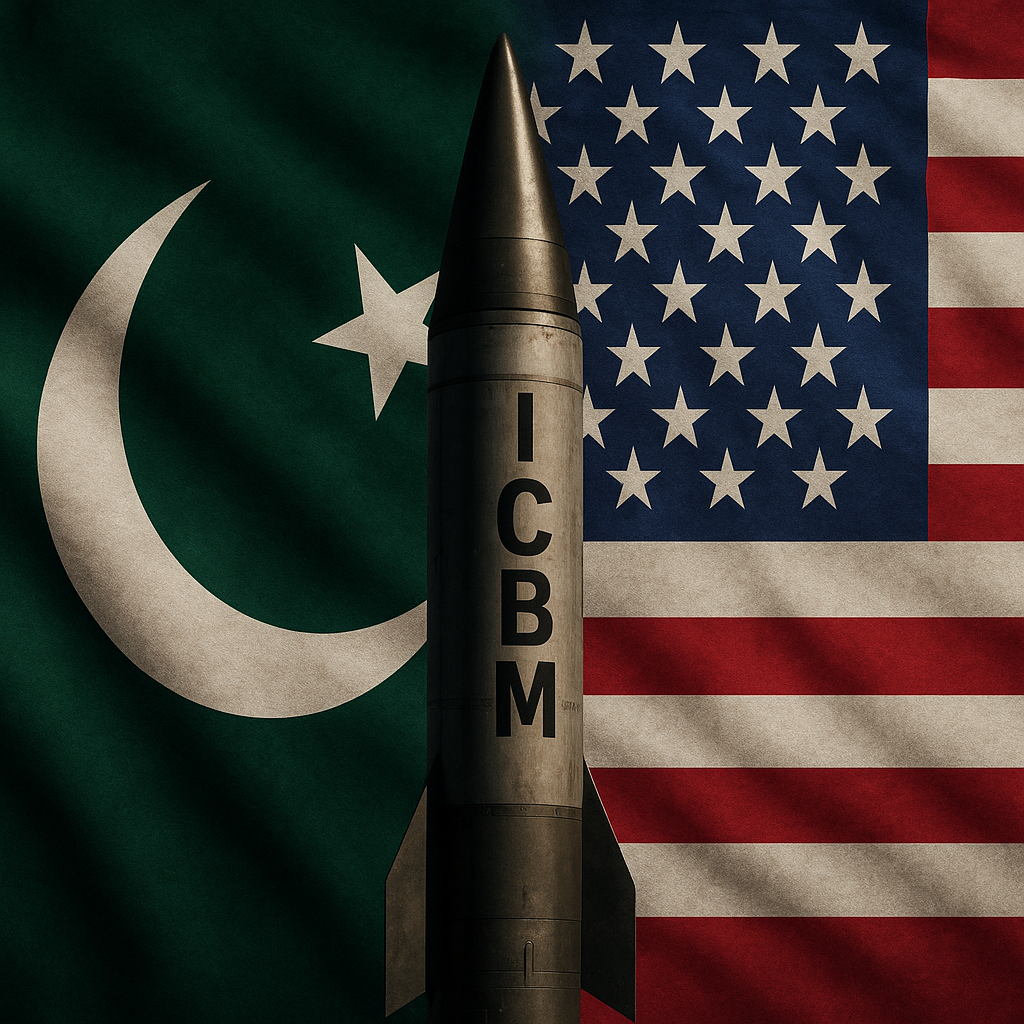ICBM Accusations: Unpacking the US Motive

An intercontinental ballistic missile (ICBM) stands against a backdrop of the Pakistani and American flags, symbolizing rising diplomatic tensions over recent US accusations.
Vipin Narang and Pranay Vaddi write in their recent Foreign Affairs article How to Survive the Nuclear Age, “U.S. intelligence agencies have concluded that the Pakistani military is developing an ICBM that could reach the continental United States”. Officials from the United States have been making such allegations for some time and, in December 2024, four Pakistani entities were sanctioned by the United States for their alleged contribution to Pakistan’s Ballistic Missile Programme. On the other hand, Washington has been providing India access to latest military technologies which is contributing to the advancement of its missile defence system. This discriminatory attitude of the US towards Pakistan is because of the later’s close ties with China, which is the strategic adversary of United States and does not stem from any real threat.
However, the claim that Pakistan is involved in the development of Inter-Continental Ballistic Missiles does not carry strong grounds. Firstly, the government of Pakistan has denied the development of long-range ballistic missiles, and the Foreign Office has called the sanctions on Pakistani firms as discriminatory and a threat to the regional and international peace and stability. Secondly, the nuclear doctrine of Pakistan is exclusively India-centric. Pakistan made nuclear explosions in 1998 only after India’s testing of its nuclear weapons. Furthermore, Shaheen-III having the range of 2750km is designed to reach the far-off Indian islands not Israel, as many falsely claim.
Though Pakistan with the assistance of its close friend China has been striving to develop its military technologies to counterbalance its arch-rival India which enjoys conventional superiority over Pakistan, it has no such plans to threaten other countries, including the U.S, across the world and invite more enemies to its door. On the contrary, the United States has a history of creating imaginary enemies for itself.
At the start of 21st century, to topple the regime of Saddam Hussain, it began creating the narrative that Iraq is making Weapons of Mass Destruction which could pose an existential threat to America, hence it should be attacked to stop such efforts. When the United Nations did not support it in its misadventure, the U.S. under the presidency of George. W. Bush attacked Iraq unilaterally in 2003. All this resulted in humiliation and global condemnation for the U.S, and a failed state for the poor Iraqi people. Despite the withdrawal of U.S. forces from Iraq in 2011, the country has still not been able to recover from the damage it caused.
The second case study is of Iran. Washington and Tehran have been adversaries since the Islamic Revolution in 1979.Since then, America has made huge efforts to keep the country economically and diplomatically isolated, and keep labelling it as a rogue state which, if develops nuclear weapons, will threaten the global peace. However, the reality is that the Islamic Republic of Iran no longer serves the aims of the United States as it used to under the liberal regime of Shah Reza Pehalwi, and it can create a challenge to the existence of the genocidal Israeli state.
Hence, using the allegation of the development of nuclear bomb, first Israel and then the United States recently attacked the nuclear facilities of Iran to dismantle its nuclear programme. Whereas, Iran continuously denies any intention to acquire nuclear weapons, and working on uranium enrichment for other peaceful purposes. Notwithstanding the fact that the U.S. used bunker buster , the most powerful non-nuclear bomb, to target Iran’s nuclear facilities, it failed in causing any serious harm but succeeded in sowing the seeds of regional instability in the already most volatile region of the world.
The purpose of mentioning the case of Iraq and Iran is to highlight the United States’ motive behind accusing Pakistan of developing ICBM. In my opinion, the United States is making such statements to build a foundation for its future plan to attack Pakistan, in case things go wrong between the US and Pakistan. Though any such attack is not imminent, it is possible in the future as the global geopolitical landscape is undergoing a massive shift and countries are reassessing their position in the emerging global order. Furthermore, the Washington is not at ease with Pakistan’s possession of nuclear weapons and it also labelled Pakistan as an irresponsible nuclear state a few years ago.
Pakistan’s nuclear weapons have always been a concern for the U.S. as Daniel S. Markey writes in his book No Exit from Pakistan, “Pakistan’s rapidly growing population, nuclear arsenal, and relationship with China and India will continue to force it upon America’s geostrategic map in new and important ways over the coming decades”. Therefore, Pakistan must deal with this issue with great strategic precision if it does not want to be labelled as a rogue state like Iran and North Korea.



